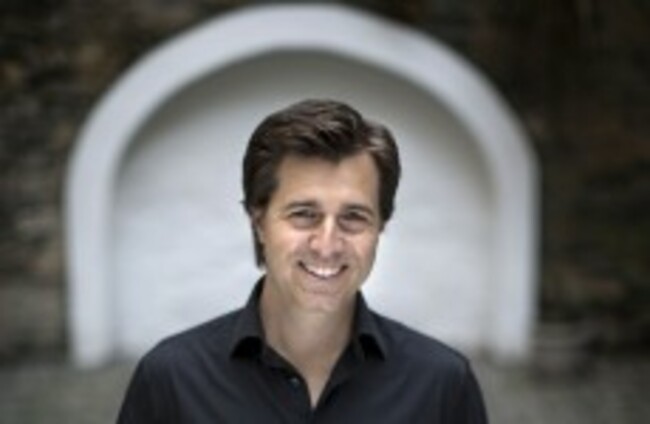IT STARTED WITH an epiphany on the Californian waves.
Now among the world’s leading experts in sports psychology and high performance, Dr. Michael Gervais’ journey of exploration into discovering what it is that drives people to achieve their maximum potential began while surfing in his high school days.
Gervais’s remarkable CV includes work with leading organisations and athletes in the NBA, NFL, NHL, MLB, UFC, golf, swimming, the US Olympic Team, Red Bull, the US Military and, just recently, Irish rugby.
He has been deservedly credited as integral to the Super Bowl success of the Seattle Seahawks earlier this year, having worked closely with head coach Pete Carroll to build the franchise’s entire underlying philosophy.
Ireland coach Joe Schmidt sat down with Gervais earlier this week to pick his brains on what makes the best athletes and organisations exactly that, but it all got underway in more personal surroundings.
As a very young athlete, I noticed the difference between free surfing and competitive surfing, for me,” explains Gervais. “I was not as good at competitive surfing.
“I was in a heat and one of my competitors, whom I surfed with on a competitive basis, said to me as I’m competing against him, ‘Gervais, you’ve just got to stop worrying about what could go wrong.’ I thought to myself, ‘how does he know what I’m thinking?’
“He didn’t tell me what to do, but I just had a moment in the water where I said, ‘Ok, well let me think about what could go right.’ It just kind of tweaked the axis that I saw the world through as a competitor.”
Gervais goes on to outline that his own swift shift in mindset sent him down the route of the “investigation of the psychology and the philosophy of the spiritual processes that are involved in being human.”
That instant fascination, one which Gervais now attempts to inspire in those he works with, has never let up.
With an undergraduate degree in psychology from Loyola Marymount University and then a PhD studying under the world-renowned sports psychologist Dr. Bruce Ogilve at San Diego University secured, Gervais has gone on to become a true master of his craft.
The Los Angeles-based Gervais was in Dublin this week to help launch Guinness’ new ad campaign, ‘Munster: Self Belief,’ with which Schmidt is also involved. The perfect timing saw the Kiwi coach and Enda McNulty – the highly-regarded sports psychologist who works with Ireland – sit down with Gervais for a “spirited conversation.”
I think it’s the same questions that all coaches and athletes on the leading edge are trying to understand – how to create an environment and culture that supports excellence,” says Gervais of the meeting.
“They were curious about the environments that I’ve been in and what were some of the consistencies that I noticed across those, both from a culture of high performance and the mental skills that cut across them. How do people pursue their very best on a regular basis?”
Having aided countless athletes and teams to succeed and discover their potential, Gervais is in an excellent position to analyse those consistencies.
“There are many ways to get out excellence, what’s important is consistency. Most engaging for people are two factors – deep and rich support for the person and challenging them relentlessly towards being their best.
“Support and challenge, which might be counter-intuitive to a modern image of greatness. But those two elements are at the centre of the most powerful relationships we can build. Support and challenge, then we look at how sophisticated we are in both. That’s the art of the coach.”
The major thread running throughout the course of a fascinating discussion with Gervais is the ability to live in the moment. It’s a well-worn cliché at this stage – a sentiment that is clearly worthy, but one which so many of us fail to put into place.
The ability to occupy and fully engage with the moment is one of the keys to performing under pressure, such an essential factor in professional rugby. Gervais talks about “dissolving” pressure by engaging in the richness of the moment.
“Can we live present in this moment? And then the next one that’s coming? And the next one that’s coming? Can we do it in a way that’s high-tone in the moment, a richness? The essence of it is that – can we string as many moments together as we can in the present way so that we can access and have glimpses of our potential?”
That’s the only way that I really understand what high performance is – stringing together moments where I can access the skills of my craft, whatever that may be, in any environment. Whether it’s hostile, intense or boring, can I access those moments?
“People have everything they need already inside them. Can we trust ourselves more deeply to live in the present moment? Even in moments that are highly built around intensity.
“Can we trust ourselves in this moment? Can we live fully present in the moment? That’s not for the faint of heart.”
Gervais is also deeply focused on helping his clients to appreciate the sheer human joy in the mastery of craft. This important factor ties into motivation, particularly when athletes and organisations have already achieved success.
How do the Seahawks approach another NFL season after their victory last time around? How do Ireland follow up their 2014 Six Nations success?
“The science of winning after winning is said to be one of the more challenging things to do in professional sports and world-class sports,” underlines Gervais.
“If you think about what drives people, there are two basic things. The love of progression and the way it feels to be a master of craft, and the other is more outcome-focused. Having security in a bank account, being recognised publicly, more the outcome-based approaches.
“When winning takes place, people get recognition and they get paid. That’s part of the process and it can actually undermine the love of mastering and the love for the craft.
What we’re always working to do is move people towards being more connected with mastery of craft, and the components that allow people to become the best in the world. Which is deep grit, and being able to do things for an extended period of time that are difficult.”
“We’re providing opportunities to support and challenge them to exercise grit, to challenge them to exercise the refinement of the craft. When winning takes place, we need to continually drive towards the mastery of craft.”
In terms of his own mastery of craft, Gervais points out that he is fortunate to “to learn every day from the best in the world.” He is also a voracious reader of scientific journals, biographies and ancient stories, anything related to “people who have shifted what’s possible in the world.”
Those learnings feed back into each one of his clients as Gervais strives to build world-class mindsets and philosophies of improvement among them. In that regard, managing nerves and worry are key, certainly an aspect of sports psychology that less experienced athletes struggle with.
“Are we facilitating a dialogue within ourselves that moves us towards our best?” asks Gervais? “If worry is chronic, it’s not facilitating. There’s a word for that – anxiety. That certainly isn’t something that facilitates great performance.
“But worrying enough, or being mindful of the things that could go wrong, but not being obsessed with it, [can be positive]. Performance anxiety is essentially a thought process – what might be coming next, I might not have what it takes to meet those demands, so I better be nervous about it.
“So flipping that on its head again is having this robust conviction in knowing that I’ve trained in a challenging environments, I’ve exercised grit, I’ve mastered my craft and I have the psychology to know that I can adjust to whatever comes up next.
“If I can adjust to whatever comes next, I can trust and let go – I can let it rip right here and right now. That’s some of the stuff of a lot of people to approach a moment, a challenge, with a high interest in what’s possible.”
It terms of what is possible, Gervais’ involvement in the Red Bull Stratos project pushed the boundaries into new territory.
In 2012, Austrian skydiver Felix Baumgartner flew 39km into the stratosphere in a helium balloon, before free falling and parachuting back to earth, breaking the sound barrier and reaching a speed of 1,357.64 km/h as he did so.
Claustrophobia and anxiety almost halted Baumgartner’s incredible achievement, as he suffered deep worry about the custom-built suit he would wear and how restrictive it was to his movement.
Gervais helped the Austrian to zone in on the moments that made up his jump attempt, however, giving him that edge to pull off a truly remarkable achievement.
“The Red Bull Stratos project was a real investigation with some of the brightest minds in aerospace, and an athlete that was highly skilled, to be able to collaborate to the boundaries of human experience.
“It was a high-stakes team environment with one athlete who was really living on the edge of danger.
“It’s a wonderful example of when an idea is compelling, how people will rally around that with some of the brightest minds in their craft to keep going and work through the challenges. Because there were challenges every day, and that’s a part of being on the frontier. There’s no road map for what has not been explored yet.”
There are lessons for all of us in feats likes Baumgartner’s, says Gervais.
“I do know that amazing things are possible, even if that sounds so pithy of me to say. We grow up watching people on TV thinking that they’re special or there’s something extraordinary about them, that they were born a certain way.
The science of that doesn’t totally fare out well. If we really strip back the science of this, the culture in which we’re raised and the sophistication of skill refinement is important. What’s underneath it is this curiosity of ‘how good I can become at something?’
“When we get obsessed with or enthralled with what’s possible and have the grit to be able to train on a relentless basis, we transform an ordinary way of living and we’re able to pursue our own potentials.
“It starts with a thought and that thought can shift behaviours.
“Investing in thinking a particular way about what is possible and having the day in, day out investment to live connected to that. It’s the exercise of the science of optimism.
“This is a tough conversation because people who have a pessimistic orientation call themselves realists. So an optimist is based in non-reality? That’s not the case. Can you invest in the science of what’s possible in a positive way?”
*******************
Munster’s historic 12-0 victory over New Zealand in 1978 is retold in a new Guinness ad campaign, ‘Munster: Self Belief,’ which will air on Irish TV for the first time on Wednesday 5 November ahead of Ireland’s opening Guinness Series fixture.






